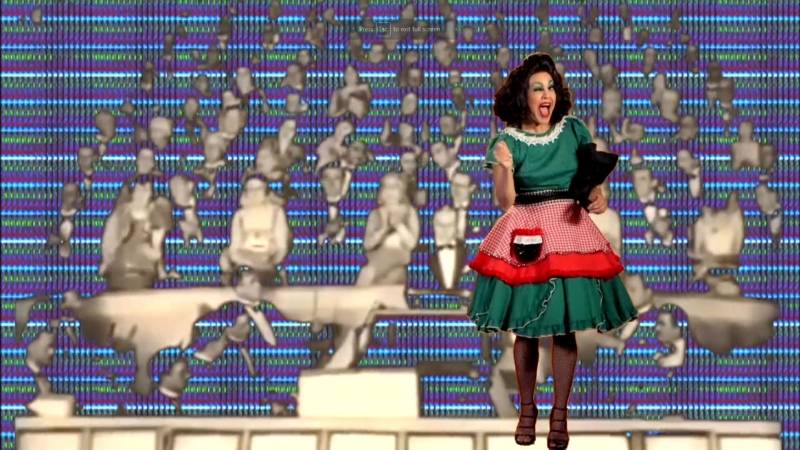Officials in a Texas city earlier this month removed “Spictacle II: La Tortillera,” Oakland artist Xandra Ibarra’s video satirizing Mexican gender stereotypes, from display in a city-owned gallery due to content deemed “obscene,” prompting cries of censorship nationally.
Texas City Censors Oakland Artist Xandra Ibarra’s ‘Obscene’ Feminist Video

The video was removed from XicanX: New Visions hours before the group exhibition curated by Dos Mestizx opened Feb. 13 at Centro de Artes in San Antonio. A city spokesperson in a statement called the video “obscene material” that flaunts community standards. First Amendment advocates call its removal a violation of constitutional free speech protections, and a petition by the show’s curators to restore the artwork so far boasts more than 1,000 signatures.
Ibarra, an established performance artist, originally developed “La Tortillera” as a live performance through her La Chica Boom persona. In the four-minute video from 2014, she dances in Mexican housewife garb to Eddie Dimas’ “El Mosquito” before removing her panties to reveal a Tapatio bottle strapped to her pelvis. Tasseled pasties cover Ibarra’s nipples as she pretends to ejaculate hot sauce onto the thongs and tortillas. The strap-on Tapatio bottle is a sculpture Ibarra created with the intention of ridiculing the fear of racial contagion or demographic change.
“If I can’t cum on my tacos, neither can you,” Ibarra said in a statement to KQED. “What I mean to say is that this is not about me, the state wants to silence urgent political movements and cultural issues that deal with race, sex, sexuality, incarceration, immigration, and war. We need to answer back even when it’s something as tame as the censorship of me cumming on tacos.”
Ibarra, a professor at California College of the Arts who’s shown at local institutions including Yerba Buena Center for the Arts, is originally from the El Paso-Juarez border region. She is also a longtime community organizer active with INCITE!, a national organization devoted to addressing violence against women of color. Ibarra created the hyper-sexualized, hyper-racialized La Chica Boom persona in the 2000s for a performance series she calls “spictacles,” aiming in part to humorously complicate and pervert Mexican iconography.
“This project was an attempt to inhabit my sexed ‘spichood’ and hyperbolize my supposed differences to discover queer forms of pleasure,” Ibarra explained. “The censorship assumes that race, sex and sexuality are not part of critically and radically thinking about aesthetics.”
San Antonio Department of Arts & Culture head Debbie Racca-Sittre said the video was removed after consulting with the city attorney. “The department has the right to determine what is displayed,” Racca-Sittre said in a statement, adding that the city has a “responsibility to make art accessible to the general public—which includes residents and visitors of all ages.”
Dos Mestizx, artist-curators Suzy González and Michael Menchaca, selected Ibarra as one of 11 artists to feature in XicanX: New Visions, a national exhibition exploring social justice and migrant identity, and agreed to install “La Tortillera” behind a blackout curtain with advisory signage. A statement accompanying the curators’ online petition describes the removal of the video as censorship, cultural erasure and “an act of discrimination and glaring homophobia.”
In a Feb. 20 letter addressed to Ron Nirenberg, San Antonio’s mayor, the National Coalition Against Censorship urged the city to restore the artwork to the exhibition, saying the video doesn’t meet the definition of obscenity established by the United States Supreme Court. Regardless of its sexual content, the coalition letter argues, city officials must prove Ibarra’s widely-shown video lacks serious artistic value in order to meet legal criteria for obscenity.
The coalition was “deeply concerned” by San Antonio officials’ decision to remove the artwork “because of your apparent discomfort with its unconventional viewpoint on representations of sexuality and the challenge it presents to gender stereotypes,” reads the letter. It goes on to cite the controversy and 1990 obscenity trial stemming from the City of Cincinnati’s interference in a Robert Mapplethorpe retrospective. “After the trial, news outlets portrayed Cincinnati as a cultural backwater that would imprison a museum director before agreeing to exhibit difficult art.”
A special public meeting of the Centro de Artes Committee is scheduled Tuesday in San Antonio to discuss the exhibition.

